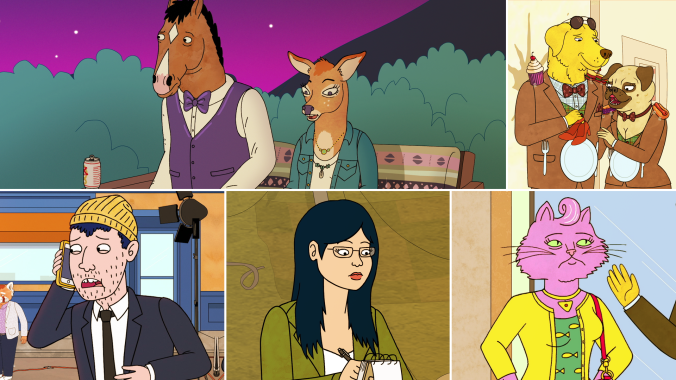5 episodes of BoJack Horseman that each spotlight a main character


In 5 To Watch, writers from The A.V. Club look at the latest streaming TV arrivals, each making the case for a favored episode. Alternately, they can offer up recommendations inspired by a theme. In this installment: With BoJack Horseman ending this week, The A.V. Club digs into the episodes that gave each of the main characters their own spotlight, and paved the way for the finale.
First, a disclaimer: We are not attempting to single out the five best episodes of BoJack Horseman, nor even rank all of the episodes. We’d be here all week, and there are still eight episodes in season six left to watch. Instead, to prepare ourselves for heartbreak (or a hooray!), The A.V. Club’s resident BoJack fans have selected spotlight episodes for each of the show’s five main characters. These are the episodes we feel capture a pivotal moment in their development, as well as set them up for the denouement.
BoJack Horseman: “Escape From L.A.,” season two, episode 11
The most brutal episodes of BoJack Horseman play almost like horror movies, as we wait for its title character’s perpetual self-sabotaging to finally kick in and wreck everything good around him yet again. The monster-movie metaphor gets very literal in the closing moments of “Escape From L.A.”: In a hesitant POV shot, Olivia Wilde’s Charlotte approaches the door to her old friend BoJack Horseman’s bedroom, strings on the soundtrack keening as she gets closer to seeing exactly what she dreads she’ll find inside: The latest betrayal since the last one, and a confirmation that BoJack Horseman is always exactly who we (and he) worried that he was. BoJack’s decision to have sex with Charlotte’s 17-year-old daughter, Penny—whether out of spite for her mother’s romantic rejection of him just a few minutes earlier, nihilistic pleasure seeking, or just his lifelong inability to untangle affection from love or lust—is the moment when BoJack Horseman finally and fully drops the façade that this is a show about an essentially good person working his way through his problems. No matter how much self-acceptance and healing BoJack Horseman does years after the fact, he will still also have done this: infiltrated a family, accepted their love and friendship with false pretenses and open arms, then, when that wasn’t enough to fill the void inside him, begun the steady and insidious process of betraying their trust in him in pursuit of more. When circling around this moment in later seasons, Will Arnett’s BoJack will have plenty of words, justifications, regrets. But in the moment, he’s very nearly silent: Arnett instead makes way for Wilde to give one of the series’ all-time-great line readings. “If you ever try to contact me, or my family again, I will fucking kill you” is terrifying precisely because it’s not a threat—it’s a calm statement of fact, one more bridge to BoJack Horseman being burnt for the safety and health of everyone still surviving on the other side. [William Hughes]
Diane Nguyen: “Hank After Dark,” season two, episode seven
The most affecting Diane-centric episode of BoJack Horseman is obviously “The Dog Days Are Over” from season five, but “Hank After Dark” is possibly more pivotal to the character’s overall arc. Audiences and most of the characters have long seen Diane as the moral compass for the show, and she spends the first half of season two trying her damnedest to point true north. In “Hank After Dark,” Diane and BoJack set out on a book tour for One Trick Pony, the memoir/compromise to come out of all their time spent together in season one. Princess Carolyn lays out their strategy: Stick to talking about the book, lest BoJack offend anyone. Miraculously, he manages to avoid putting a hoof in his mouth; Diane, however, ends up wading into choppy waters. When asked if she worried the candidness of the memoir would derail BoJack’s career, Diane responds with a list of powerful men (real and fictional) in the entertainment industry who keep finding work despite allegations of abuse. Among them is Hank Hippopopalous (Philip Baker Hall), a beloved entertainer and Mr. Peanutbutter’s (Paul F. Tompkins) idol. Diane ends up on the news, where she takes everyone, including journalists who euphemize allegations when they’re not just ignoring them, to task for their part in enabling abusers. Spurred on by Princess Carolyn, she tries to write an exposé on “Uncle Hanky,” only to be thwarted by business interests and Hank himself, who tricks her into meeting with him. What makes this such a wrenching and crucial episode for Diane is the parallels we can draw from Hank to BoJack; the hippopotamus’ insistence that he’s “not a bad guy” echoes BoJack’s own protestations. In her attempts to effect change from within it, Diane became more compromised, more entangled in that culture of inequity. But as the show nears its end, we can also see how she tried to find her way back out of the quagmire. [Danette Chavez]
Princess Carolyn: “Ruthie,” season four, episode nine
The women of BoJack Horseman work much harder than the men as a rule, and Princess Carolyn (Amy Sedaris) is a prime example. She is indefatigable as she knocks herself out for clients like BoJack and Mr. Peanutbutter, trying to carve out a career for herself in the fierce jungle of Hollywoo, usually receiving very little in return. And Princess Carolyn also has dreams that go past her career, toward becoming a mother someday. In season four’s “Ruthie,” we learn just how much Princess Carolyn wants that future, as her great-great-great-granddaughter Ruthie (Kristin Bell at her perkiest) gives a presentation to her grade-school class about her ancestor Princess Carolyn’s worst day ever. She dumps coffee on her outfit, breaks her favorite necklace, learns it is not a priceless heirloom but a piece of costume jewelry, and fires her beloved assistant, Judah. Worst of all, Princess Carolyn learns that she’s miscarried. Again. Her dinner with boyfriend Ralph as a string of “Miss Carrie”s stroll in (Underwood; Mulligan; Mariah, last name Carey) is straight-up brutal. As devastating as it is to watch one of BoJack Horseman’s strongest characters seemingly get destroyed, the spunky Ruthie assures her confused teacher and class (and audience) that we’re headed toward a happy ending. But that ending in fact turns out to be a total gut punch: Princess Carolyn ends her horrible day by telling BoJack that Ruthie is an invention of her own design, to assure herself that everything eventually is going to be okay. Even the constantly self-delusional BoJack calls that out as “not real,” and we are crushed because we totally bought into it as well. Princess Carolyn’s eventual happy ending is nothing but a fantasy, but it’s one that keeps her going through imaginably tough times. We end up having more respect for the steely Princess Carolyn than we even did before, and Sedaris’ performance is, as always, absolutely flawless. [Gwen Ihnat]
Todd Chavez: “Hooray! Todd Episode!,” season four, episode three
“I never know if I can handle anything! That’s what makes my life so exciting.” Todd Chavez has grown up quite a bit on BoJack—he started off a couch-surfing slacker, then drifted from one improbably prestigious job to the next (R.I.P. WhatTimeIsItRightNow.com). But in the midst of all those “silly Todd adventures,” he became more nurturing than anyone else, even stepping in to help Princess Carolyn with Ruthie, née Untitled Princess Carolyn Project, early in season six. This caring side first shone through in “Hooray! Todd Episode!,” which is full of the usual Todd-dos, but gradually builds to a moving revelation about his asexuality. Todd dashes all over Los Angeles to help his friends, including new addition Hollyhock (Aparna Nancherla); he even agrees to pose as the boyfriend-turned-fiancé of one of Princess Carolyn’s clients. The dynamics in these relationships shift throughout, as he grows closer to Diane—commending her on her journalistic integrity—and works through his feelings with BoJack. Todd is angry at his old horse pal for sleeping with his friend Emily (Abbi Jacobson), and he tells him so, refusing to let BoJack deflect by spiraling into self-pity. Todd’s selflessness throughout and recognition of BoJack’s patterns point to his own maturation, which gets another boost when he confirms aloud that he’s asexual. It’s a sweet and significant moment, both for the character and the show. “Hooray! Todd Episode!” speaks to the different kinds of relationships in Todd’s life, and how fulfilling he finds them. The episode also sets him on a path to making a life for himself, one he learns to be proud of even in the face of his exacting stepfather Jorge Chavez (Jaime Camil), who showed up at the beginning of season six. Todd’s pursuit of happiness doesn’t resemble anyone else’s, but it’s just as valid. [Danette Chavez]
Mr. Peanutbutter: “Mr. Peanutbutter’s Boos,” season five, episode eight
Mr. Peanutbutter is certainly clueless—a perfect BoJack example of how men tend to fall upward—but he’s also one of the rare BoJack characters focused on affection over ambition. Like the rest of his species, Mr. Peanutbutter just wants to be loved, but as his string of ex-wives proves, he has a hard time achieving that particular goal. The season-five episode “Mr. Peanutbutter’s Boos” perfectly outlines Mr. PB’s romance troubles, flashing back to four separate Halloween parties, one for each wife as well as his current relationship, Pickles. Each time, Mr. Peanutbutter is certain that he and his date are headed out for the best party ever, and each time, the party ends in disaster. Some, granted, are not Mr. Peanutbutter’s fault: How could he have known that BoJack was going to craft a last-minute mummy costume, leading to trauma for his then-wife Jessica Biel? But PB’s tendency to rock the party, leaving his date to fend for herself, unfailingly leads to a public spat and a damaged relationship. Pointedly, it’s not a lesson he ever learns even over 25 years, as the episode deftly travels from 1993 to 2018, using varying palettes, as well as costumes and hairstyles (like Princess Caroline’s spot-on 1990s Friends cut, or squeaky-voiced 13-year-old Todd) to help differentiate between shindigs. By 2018, it finally dawns on even the big-hearted but thick-headed Mr. Peanutbutter that the common denominator in all of this relationship failure is himself. But it takes the specific insight of third wife Diane to point out that the real trouble may be his tendency to date much younger women, who eventually grow up while he stays the same (cue sneakily brilliant Dazed And Confused reference). Whether Mr. Peanutbutter will actually learn this lesson to make his relationship with Pickles work remains to be seen, but at least now he knows what the problem is. [Gwen Ihnat]
Les Chappell’s binge recaps of the final eight episodes of BoJack Horseman will begin Friday, January 31.